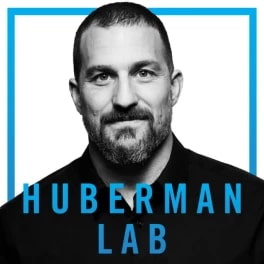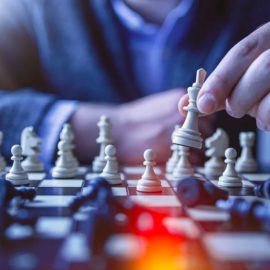

This article is an excerpt from the Shortform guide to "Huberman Lab". Shortform has the world's best summaries and analyses of books, podcasts, and more.
Like this article? Sign up for a free trial here.
Is willpower like a muscle? What small habits can you do every day to strengthen your resolve?
According to Andrew Huberman, willpower and tenacity are prerequisites for goal achievement. On an episode of his podcast Huberman Lab, he discussed the science of willpower, how to build mental strength, and the secrets of “super-agers.”
Continue reading to get Huberman’s take on willpower and perseverance.
Andrew Huberman on Willpower
According to Dr. Andrew Huberman, willpower and tenacity are the keys to achieving long-term goals. On his podcast, he clarified that consciously exerting self-discipline rewires persistent neural pathways. Huberman referenced the ancient Greeks and William James to provide historical context for the science of determination. This framed the discussion within a broader philosophical tradition.
The Neuroscience of Resolve
The podcast episode delved into the brain circuits related to drive and motivation. Specifically, Huberman focused on the anterior mid-cingulate cortex (aMCC). This region balances internal and external inputs, impacting behavior from enthusiasm to listlessness. The aMCC is vital for high achievement and successful dieting via its role in modulating motivation.
Controversies in Willpower Research
Huberman scrutinized the concept of ego depletion popularized by Roy Baumeister. This likens self-control to a fatiguing muscle. But, researchers such as Carol Dweck dispute whether willpower truly has limits. Debates on whether glucose impacts cognitive stamina have also stirred controversy.
Building Resilience in Life
Huberman suggested developing positive habits. These include quality sleep, balanced nutrition and embracing minor daily challenges or “microsucks.” Such lifestyle changes and self-tests can enhance mental determination over time.
Balancing Challenge and Reward
While discussing the benefits of taking on challenges, Huberman cautioned against over-relying on external rewards. He warned that excessive incentives could ultimately reduce motivation. Instead, he highlights “super-agers” who seem to maintain sharp cognition via continuous learning and intellectual engagement throughout life.
Listeners were encouraged to apply the podcast’s personalized guidelines for strengthening willpower and resilience. Huberman promoted further engagement via the Lab’s online content, including actionable insights on fortifying determination.
More Perspectives
Sure, grit and determination are championed as keys to unlocking your potential. But, is it that simple? Not quite.
While willpower and tenacity play a role, systemic inequalities and access to resources can’t be ignored. Pushing through alone might not be enough when faced with barriers beyond your control.
Think of willpower as a muscle. Habits are your workout. They automate actions, reducing reliance on willpower and boosting long-term success. And, while history offers valuable insights, remember that contexts evolve. Ancient self-discipline might not translate directly to our world.
Willpower itself is complex. The “ego depletion” debate? Still murky. Glucose levels? Just one piece of the puzzle. Motivation, fatigue, individual differences—they all matter when your control fluctuates.
Sleep, nutrition, and exercise contribute, but that’s not the full story. Genetics, socioeconomic factors, and healthcare access all influence one’s ability to persevere. Pushing through discomfort is valuable, but remember that tolerance varies.
What about motivation? Find a blend of intrinsic satisfaction and extrinsic rewards for lasting drive. Lifelong learning is great, but don’t forget physical activity and social connections.
Personal achievement demands a deeper look. Recognize systemic challenges, harness the power of habits, and consider all factors impacting your determination. Critically evaluate evidence, acknowledge limitations, and seek diverse perspectives.
Related Reading
How to Increase Your Willpower & Tenacity – Huberman Lab
In this episode, Huberman discusses neuroscience and psychology studies that address the basis of willpower and tenacity, how they differ from motivation and how we can all increase our levels of willpower and tenacity.
The Origins of Psychology: History Through the Years – Verywell Mind
While psychology did not emerge as a separate discipline until the late 1800s, its earliest history can be traced back to the time of the early Greeks. During the 17th-century, the French philosopher Rene Descartes introduced the idea of dualism, which asserted that the mind and body were two entities.
How Willpower Wasn’t: The Truth About Ego Depletion
New research suggests that willpower research was wrong. Ego depletion, a modern psychological take on willpower, has been studied in over a hundred research studies.
The Willpower Instinct by Kelly McGonigal
Most people think of willpower as a virtue, an admirable trait that we strive for but don’t always achieve. But science tells a different story. Willpower—the ability to exercise self-control when you need it—is an instinct that’s wired into our brains. Yet it seems like willpower vanishes at crucial moments, like when your coworker shows up with a box of donuts.
To harness your innate willpower, you need to understand what factors make you give up your self-control. In The Willpower Instinct, Stanford psychology professor Kelly McGonigal details how our natural willpower gets compromised by stress, distraction, lack of sleep and exercise, and a host of other factors. Using the latest psychology and neuroscience research, she offers strategies to help us defeat procrastination, control cravings, and achieve our goals.

———End of Preview———
Like what you just read? Read the rest of the world's best guides to Huberman Lab" at Shortform.
Here's what you'll find in our full Huberman Lab episode summaries:
- How science can be applied to improve your daily life
- Information about key scientific tools and how they impact society
- How technology, biology, and health are connected






